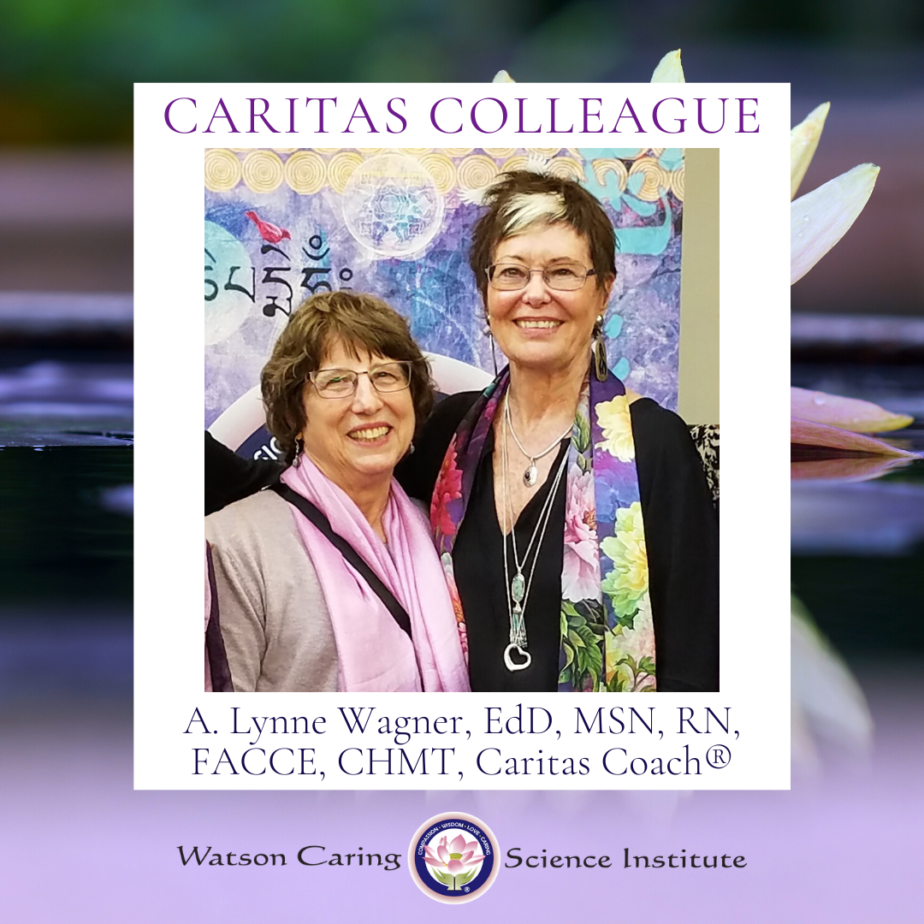April 2020
We continue to highlight our Caritas Colleagues and share their contribution and commitment to Caring Science. This month we are celebrating: A. Lynne Wagner, EdD, MSN, RN, FACCE, CHMT, Caritas Coach®
Love whispers.
Listen.
It has a story to tell,
our connected story.
Listen.
Healing is the miracle.Caring Science fosters deeper subjective dimensions and meaning to nursing science. It expands knowing self and others, beyond disease and medical treatment, beyond an empirical objective lens. Considering each person’s story humanizes and individualizes caring experiences in health and illness, suffering and healing, birthing and dying, despair and joy. (Wagner, June 2019, p.7)
Discovery of Jean Watson’s Theory of Human Caring in the 1980s fully affirmed my humanistic beliefs and values for nursing practice and education. I first met Jean in 1993 at the IAHC conference, where I presented my story of breast cancer through the unconventional aesthetic lens of journal writings, poetry, and photography. Jean affirmed that subjective, aesthetic ways of knowing are essential to transformative caring for self and others. That conference and my courage to be vulnerable and creative in sharing my humanity changed my life forever, personally and professionally. When I let the poet in me meet the nurse in me, I honored my wholeness. I found my soul work.
Areas of Expertise
- Nursing Educator
- Caring Science Scholar, Caritas Coach®
- Caring Mentoring Programs
- Aesthetic Ways of Knowing through Storytelling and Poetry
I presently work as Nurse-Educator Consultant, facilitating caring mentoring programs and presenting workshops/presentations nationally and internationally on developing and sustaining holistic caring practices. As Faculty Associate at Watson Caring Science Institute, I teach in the Caritas Coach Education Program® (CCEP) and serve as Visiting Scholar. My research and writing focus on holistic mentoring, reflective storytelling, how nurses develop caring-self, caring science in practice, and aesthetic inquiry, using poetry, photography and other aesthetic ways of knowing. I developed The Caring Mentoring Model© (2007), which has been referenced and used nationally and internationally and received the 2018 ANA Massachusetts Mary A. Manning Mentoring Award. Authoring many published journal articles and book chapters, my book, Four Seasons of Grieving: A Nurse’s Healing Journey with Nature (2015), was awarded the 2015 American Journal of Nursing Book of the Year-1st place in Palliative Care and Hospice category.
Contribution to the Legacy of Caring Science
As first Director of CCEP, I shaped the early program and successfully applied for CCEP’s first ANCC accreditation. My continued work in CCEP as faculty is a great joy, working with my fellow WCSI faculty members in a transpersonal teaching-learning environment and together helping to prepare hundreds of Caritas Coaches worldwide to become change agents in transforming personal lives and hospital systems to places of compassionate healing and human flourishing.
Through both professional and community presentations and publications, I help disseminate and translate Caring Science knowledge and research into caring practice. My gift to explore and translate human experiences through the aesthetic lens of journaling, storytelling, poetry, and photography have helped others know their stories and humanity at deeper heart levels of feelings and meaning. I teach students and nurses to find their voice through journaling and poetry-writing as a valued way of knowing self and others in our connected humanity. Serving on the Editorial Board of International Journal for Human Caring and reviewing for the Advances in Nursing Science, I have encouraged other authors in their work.
At the regional level, in 2013 I founded the grassroots Massachusetts Regional Caring Science Consortium, inviting nurses in New England to gather and dialogue about caring practice. This Consortium, which started as 2-hour evening meetings, has evolved to half-day conferences twice yearly, which I lead and plan in partnership with hospitals and schools of nursing across the state. Living caring science is a forever changing journey of growth, revelation, connectedness, and love.
Favorite Caritas Process®
My favorite Caritas Processes® are CP1—Sustaining humanistic-altruistic values by practicing with loving-kindness, compassion and equanimity with self and others, and CP10—Opening to the spiritual, mystery and allowing for miracles. I believe that these first and last Caritas Processes hold and frame the others, preparing us to be intentionally, authentically present and listening to our own and other’s stories, honoring positive and negative feelings. Embracing CPs 1 and 10 guides us to be the healing environment by our loving-trusting acceptance of another’s reality; our transpersonal teaching-learning; compassionate support of human dignity; and our creative artistry of ‘solution-seeking’ through objective/subjective, scientific/aesthetic ways of knowing. During personal challenges of illness and caring for loved ones, patients, and students, the miracle is that healing happens in the presence of love and compassion, even if it is inexplicable.
Location:
Chelmsford, MA. USA
Recent publications:
- Wagner, A.L. (June 2019). A brief introduction to caring science: A model for caring-healing nursing practice and nursing education. Massachusetts Report on Nursing, 17(2), p. 7. (Official Publication of ANA Massachusetts)
- Wagner, A.L. (2019). Narrative healing. In W. Rosa, S. Horton-Deutsch, J. Watson (Eds.). A Handbook for Caring Science: Expanding the Paradigm (pp. 587-597). New York, NY: Springer Publishing Co.
- Wagner, A.L. (2016). Engaged and expressed: Storytelling as a way to know and be known. In Rosa, W. (Ed.). Nurses as leaders: Evolutionary visions of leadership (pp. 431-451). New York, NY: Springer Publishing Co.
- Wagner, A. L. (2015). Four seasons of grieving: A nurse’s healing journey with nature. Indianapolis, IN: Sigma Theta Tau International. (Awarded 2015 American Journal of Nursing first place award in Palliative and Hospice Care Category)
- Wiklund Gustin, L & Wagner, L. (2012). The butterfly effect of caring – clinical nursing teachers’ understanding of self-compassion as a source to compassionate care. Scandinavian Journal of Caring Sciences; doi: 10.1111/j.1471-6712.2012.01033.x. (9 pages).
- Wagner, A. L. (2008). A Caring Scholar Response to “Uncovering Meaning Through the Aesthetic Turn: A Pedagogy of Caring. International Journal for Human Caring, 12(2), 24-28.
- Wagner, A.L. & Seymour, M.E. (2007, Sept./Oct.). A Model of Caring Mentorship for Nursing. Journal for Nurses in Staff Development, 23(5), 201-211.

